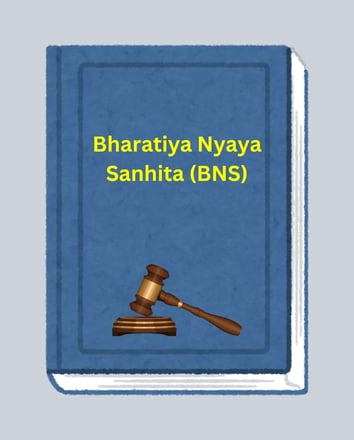Bharatiya Nyaya Sanhita – A Comprehensive Overview
Kumari Sneha
It has been written by Kumari Sneha, a fifth-year law student of Heritage Law College


The centre has issued three gazette notifications, informing that the three new felonious laws- Bharatiya Sakshya Adhiniyam (BSA), Bharatiya Nagrik Suraksha Sanhita (BNSS), Bharatiya Nyaya Sanhita (BNS) has replaced the Indian Evidence Act 1872(IEA), Code of Criminal Procedure 1973(CrPC) and Indian Penal Code 1860(IPC), which dated back to the period of British India.
It was the last December when the three new criminal laws got passed in the parliament (winter session). President Droupadi Murmu gave her assent to the three laws in
December 2023. The new laws came into effect from 1st July 2024.
The Bharatiya Nyaya Sanhita is a landmark corner action which is introduced to contemporize and reform India’s geriatric criminal justice framework.
HISTORICAL BACKGROUND
The preface of the BNS aims to decolonize the legal framework, making it more relevant to contemporary India and its diverse population.
It is designed to address the contemporary societal, technological, and legal challenges that have arisen since the colonial era. This new legislative framework
has been precisely drafted by a commission of legal experts and policymakers to ensure it meets the evolving requirements of Indian society.
IPC continued as a relic of British period that did not align with the evolving ultramodern rights.
THE NEW CHANGES
1- In the new Sanhita 19 provisions of the IPC have been neglected and 21 new offences have been added.
2- For 23 offences a mandatory minimum discipline has been introduced.
3- For 83 offences fines have been increased and for 33 offences punishment of imprisonment has been increased.
4- The Sanhita criminalizes acts of abetting or conspiring to commit offences.
5- Economic offences and medical negligence are now considered crimes.
6- Sedition has been replaced by treason. Any act endangering India’s unity or integrity will be considered as treason. (Offences against the state)
7- Any crimes committed during riots will now be scrutinize as terrorist acts.
8- The new Sanhita now includes community service as a punishment.
9- It adds new offences like fiscal fraud and cybercrime.
10- The new Sanhita will now consists of only 358 sections with 20 chapters as compared to 511 sections in IPC. The offences against children and women have been given precedence.
ADDITION OF NEW PROVISIONS
MOB LYCHING- Section 103 is linked to offences like mob lynching and hate crime. It considered for the cases where a mob of 5 or further individualities commits murder for factors such as race, caste, language, personal belief, community and place of birth.
DECEITFUL PROMISE TO MARRY- Section 69 talks about false promise to marry. This includes false promise of marriage, employment, identity suppression. for this act the rigorous punishment is fines and imprisonment up to 10 years.
ORGANISED CRIME- Section 111 encompasses any unlawful activity like robbery, kidnapping, contract payoff, extortion, hijacking, human trafficking, illicit goods or services and weapon is punishable under the Sanhita.
SNATCHING- Section 304 of BNS deals with the offence of snatching. Till now offence of snatching was not present in the IPC, earlier cases of snatching were treated as robbery or theft.
DELETION OF PROVISIONS
ADULTERY- The entire section 497 of IPC has been omitted under the Bharatiya Nyaya Sanhita. The offence of adultery was stuck down by the supreme court as unconstitutional in 2018.
UNNATURAL SEXUAL OFFENCES- Section 377 of IPC defines unnatural sex as sexual intercourse against the permission of any being has been repealed under the Bharatiya Nyaya Sanhita.
THUGS- Section 310 of the IPC has been omitted by BNS.
WAY FORWARD
There must be other alternate sentencing option for non-violent offences to provide a chance for reform and reduce the overcrowding in prison.
There must be regular mindfulness awareness campaigns and educational programs to inform citizens their rights and responsibilities within the justice system.
It must be ensured that the Sanhita laws are clear, concise and easily understood by both legal professionals and public. It also strengthens to protect victims’ rights and ensure their access to justice.
CONCLUSION
The preface of BNS is a positive decision to resuscitate the IPC. Reforming criminal laws is a complex and ongoing process that requires deliberation, collaboration and commitment to upholding justice and fairness for all the member of the society. It rightfully promotes the principles like gender neutrality. The aim is to create a just, fair, and equitable society where the rule of law prevails, ensuring peace, security, and harmony for all its citizens.
It seeks to bring more stringent provisions in respect of crimes against child and women. It consolidates the haphazard provisions and reduce the number of sections.
